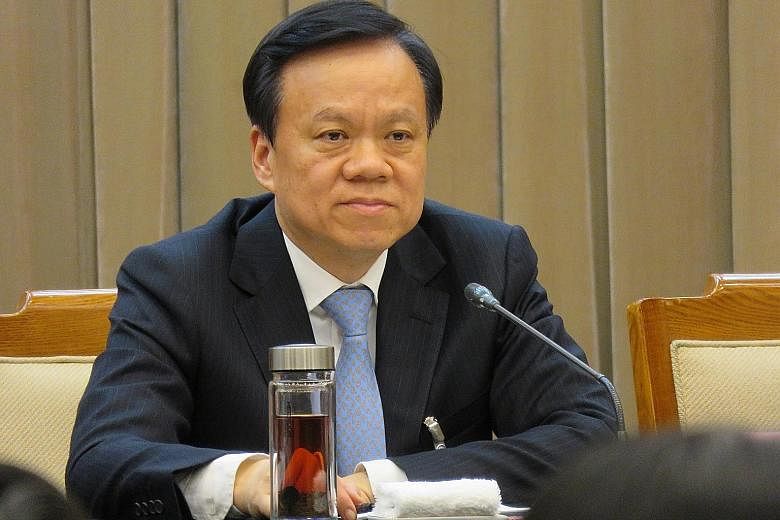The star of new Chongqing party chief Chen Min'er is burning bright even as analysts have mixed views of his achievements and how far he might go.
Mr Chen, who will be 57 in September, was until earlier this month the party secretary of one of the poorest provinces in China, the remote and mountainous Guizhou.
Then on July 15, came the sudden announcement that he is replacing the hitherto high-flying Chongqing party chief Sun Zhengcai, 53.
Chongqing, unlike Guizhou in the south-west, is one of the most important economic hubs of China.
A municipality of 36.7 million people, it is an inland port on the upper reaches of the Yangtze River and a gateway to China's western region. It is also one of the key nodes of the ambitious Belt and Road Initiative started by President Xi Jinping in 2013 to link China by land and sea trading routes to Africa and Europe.
Whoever is picked to lead the megalopolis has "the best stage" to project his ideas and demonstrate his talents, said Hong Kong-based political analyst Willy Lam.
However, Mr Sun, once tipped to be promoted to the apex Politburo Standing Committee (PSC) at the 19th Party Congress slated to take place in the autumn, appeared to have stumbled earlier this year.
A report in February by the country's corruption watchdog stated that the "evil legacy" of its disgraced former party chief Bo Xilai had not been completely removed.
Now Mr Chen, a trusted protege of Mr Xi, has taken over, with his first pronouncements being to "resolutely eliminate the evil legacy" of Bo, who is serving a life term for corruption and abuse of power. Bo had previously been a potential rival of Mr Xi.
Mr Chen was born in 1960 in Zhuji county in the coastal province of Zhejiang, which became one of the wealthiest provinces in China following reform and opening up in 1978.
It was in that year that he went to Shaoxing Teachers College, now Shaoxing University, a school started in 1909 that had the influential leftist writer Lu Xun as one of its educationists. Not much is known about Mr Chen's family background.
After leaving college, he spent the next three decades in Zhejiang, rising through the Communist Party ranks to become a member of its 205-member central committee in 2012. That same year, he was moved to Guizhou province as deputy secretary from his post as vice-governor of Zhejiang province, going on to become Guizhou's party chief in 2015.
But in 2002, Mr Chen's career in Zhejiang began to overlap that of Mr Xi's - a phase that possibly changed the trajectory of his career.
Mr Xi had arrived that year from Fujian province first as deputy party secretary of Zhejiang and then party chief, his first top-level provincial job, in the same year.
Between 2002 and 2007 when Mr Xi was Zhejiang's party boss, Mr Chen was the director of the province's propaganda department.
Wrote Chinese elite politics expert Li Cheng in his book Chinese Politics In The Xi Jinping Era: "It was widely believed that Chen Min'er provided much support for Xi's weekly columns published in the provincial party newspaper Zhejiang Daily during these years."
Indeed, Dr Lam said Mr Chen wrote those columns for Mr Xi.
As for Mr Chen's achievements thus far, the views are mixed.
Dr Li, who is with the American think-tank Brookings Institution, wrote that Mr Chen is "known for his liberal policies promoting market reform and his leadership capacity in running both an economically advanced province (Zhejiang) and an economically underdeveloped province (Guizhou)".
However, Dr Lam is of the view that while Mr Chen has acquitted himself well in Guizhou, his poverty alleviation achievement there was aided by the injection of funds from the central government. It has been reported that in recent years, Beijing has pumped billions of yuan into Guizhou to alleviate poverty and develop its big data industry.
As for where Mr Chen goes from here, pundits believe he should be a shoo-in for the 25-member Politburo at the 19th Party Congress.
But a question mark remains as to whether he would be inducted into the seven-member PSC either at the coming congress or the one five years from now in 2022.
Some like Dr Lam believe Mr Xi, who has consolidated power in the run-up to the leadership reshuffle at the 19th Congress, is not in a hurry to promote those born in the 1960s - the sixth-generation leadership hopefuls who will succeed Mr Xi and his contemporaries - to the top body. If this reading is correct, it means another sixth-generation hopeful, Guangdong party chief Hu Chunhua, would also not be promoted to the PSC this time round.
And while Mr Chen, described as an avid reader and calligraphy buff, is in contention for a place in the apex body, he does not have an overwhelming advantage.
This is because he has not done anything spectacular, said Dr Lam.
He has toed the line and shown allegiance to Mr Xi. But "whether he has ideas of his own, nobody knows", added Dr Lam.
Mr Chen can use his time in Chongqing to prove his mettle.
But it will not be easy. People there still miss the popular Bo, who had rooted out organised crime among other things, and is seen by some to have been unfairly treated.

